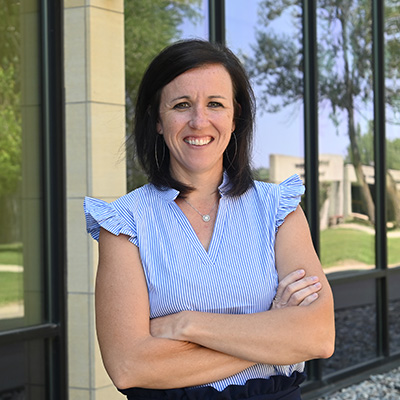
Cortni Krusemark
The newest doctoral program at Briar Cliff University began with its first group of occupational therapy students taking courses in mid-June. The cohort of students are embarking on an impactful three-year chapter of their life.
Cortni Krusemark is the chair who helped BCU launch of the Doctor of Occupational Therapy (OTD) program, which has been a lot of concerted work for her and other BCU officials.
“It is challenging, it is exciting, all these emotions,” Krusemark said.
Krusemark said her religious faith is a key component of who she is, so on the toughest days experienced in launching the new program, she leaned into that faith. She loves working at Briar Cliff, which delves into the Franciscan value system of service to others. The Sisters of St. Francis created BCU in 1930 in part to provide education to some people who otherwise wouldn’t have a chance at higher education, and Krusemark said that dynamic also fits for the new OT doctoral program.
“I envision that our graduates will be self-motivated and self-directed change agents, who will identify the needs of people, groups, and communities in our society to serve them -- not just to help them, but to serve them. I think serving is more important,” Krusemark said.
Krusemark grew up in Hubbard, Nebraska, and went to Wayne State College in Wayne, Nebraska, via a scholarship directed to students steering towards health care service in rural areas. She received an undergraduate degree in health science from Wayne State in 2003, then an Doctor of Occupational Therapy degree from Creighton University in Omaha in December 2004. After providing therapy at an Omaha institution serving people with brain and spinal cord injuries, she moved with her family back to Siouxland in 2009, taking an assistant professor position with Creighton. Krusemark at the same time was also the therapy clinic director at Twelve Clans Unity Hospital in Winnebago, Nebraska, for 10 years.
Through those posts, she knew BCU Physical Therapy Department Chair Patrick Cross, who began talking to Krusemark about the OTD program being investigated. BCU officials did a needs assessment, which showed there was a market for a doctoral occupational therapy program, by virtue of Iowa and South Dakota needing more OTD professionals, plus the growing trend towards health care that is proactive rather than reactive. The U.S. Bureau of Labor Statistics says the number of OTD positions will grow by 17 percent over the next 10 years.
“Occupational therapy approaches health care from a more holistic approach. Our specialty is really in looking at the mental and physical health of a person,” Krusemark said, explaining the difference between OTD and physical therapy. “We complement each other so well.”
Krusemark was hired in 2019 to launch the OTD program, which was launched four years later. The department has two other professors besides Krusemark, and three more are slated be hired by January 2024, to get to the needed six total.
The functioning of the OTD program involves a block curriculum format that allows students to focus on one or two courses at a time. Community-centered experiences begin in the first year, including the Briar Cliff Clinic, to practice what is learned in the classroom. The final year is made up of a series of clinicals ranging from 8 to 14 weeks.
The dynamics of working for three straight years over nine semesters with short breaks in between make for an intensity in the OTD program that can be challenging. Krusemark said she has made sure the students know they are part of a joint community, where the fellow students, professors, and BCU student support programs, such as COMPASS, can be tapped.
“It is a community of learning, you have to be engaged and you are not in it alone. Everybody wants to help,” she said.
Krusemark relishes being a professor, in part for the ability to help students recognize strengths within themselves that they had not previously known.
“I enjoy helping students recognize their potentials and seeing their light bulbs go off. When I experience that, I can really feel their passion to go out and serve,” Krusemark said.
This is part of a series of Faculty Stories profiling all the chairs of BCU academic departments in 2023.